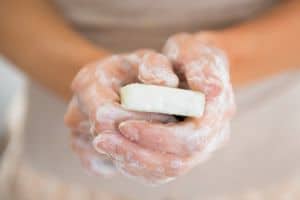Soap is an essential tool in our day-to-day life that we assume has to be one of the safest products around. After all, we use it on our skin, dishes, and our clothes with the assurance that it will do us no harm. But, what about soap as a fire risk?

Generally, soap is not flammable. It does have a melting point, however, and the effect of soap can differ depending on its form. Generally speaking, it is pretty safe to store and be around. However, many people confuse soap and hand sanitizer, and it is important to remember that, unlike soap, hand sanitizer is flammable.
With all this in consideration, I want to look at the flammability of soap and its ingredients in more detail. We’ll start with the safety of general soaps in day-to-day life, look at the risk from that melting point, and then discuss the dangers in soap making and the fire bubble experiment.
Table of Contents
Is Soap Combustible?
While soap isn’t considered flammable, it can catch fire at extreme temperatures. With that said, it requires such a high flash point that it doesn’t really burn.
Instead, it just melts down due to the chemical composition.
While this is better than bursting into flames in some ways, you still don’t ever want to be in a situation where it gets this hot.
Is Bar Soap Flammable?
There aren’t too many risks with a bar of soap out on the bathroom counter. The high melting point means that it will take a lot for this to burn and melt away.
One consideration here, however, is the composition of the soap and the additional ingredients included.
Some artisan makers will add dried botanical ingredients to the outside of the soap to make them look pretty.
These would add an organic fuel source that could ignite in contact with a flame. But, they are also so small that they would burn away very quickly and not pose too big a risk.
Is Hand Soap Flammable?
You might not have bar soap at home and prefer liquid soap instead.
Liquid hand soap is a lot different to bar soap as there will be additional agents to create that gloopy consistency and good foaming action.
Still, it doesn’t pose a fire risk because of similar high melting points. The bigger concern here in the event of a fire would be the plastic container melting and creating toxic fumes.
Is Hand Sanitizer Flammable?
We can’t talk about hand soap without mentioning hand sanitizer.
We all used a lot more of this in our homes in recent years, and probably still have bottles in the bathroom ready as needed.
This is a different substance to soap because of the alcohol content, which allows for that effective germ-killing power.
This alcohol means that hand sanitizer is flammable and more dangerous in contact with an open flame.
So, you want to be careful where you store it and to keep it away from open flames.
Is Dish Soap Or Detergent Flammable?
Once we start getting into the more intensive cleaning products for the home and our clothes, you might expect a few more dangerous chemicals and possibly some flammable elements.
However, there is no additional risk with dish soap or detergent when left out on a counter or stored in a cupboard.
Some experts warn about the higher risk when soap encounters fuel from a grease trap and a point of ignition.
Still, the risks are low.
Is Soap Toxic When Burned?
There is a toxicity risk when it comes to burning soap, particularly some liquid soap products. There is a chance that it will release carbon dioxide and carbon monoxide.
You especially don’t want carbon monoxide in the atmosphere during a fire when you are already struggling to breathe.
Thankfully it takes so much heat for liquid soap to get in this state that you should be a long way from the fire by then.
Can You Use Soap To Put Out Fires?
It is possible to put out some fires with soapy water because of the suppressive power of the water and the foamy suds from the soap.
However, this doesn’t mean that you should start mixing up a bowl of water with lots of dish soap if a fire starts in the kitchen.
There are better and more efficient methods for dealing with kitchen and grease fires.
It is important to smother the flames as soon as possible and you can find that baking soda is a good candidate for this. This is something I discuss in more detail in this other guide.
The Fire Risks In Soap Making.
When talking about the fire risks of soap, we also need to talk about soap making.
This is a popular hobby and side venture for a lot of people, as it is easier than ever to source the right ingredients and molds to make hand-made soap to sell or gift to loved ones.
The finished bar of soap will have the same risk as any other bar you might buy in stores, with the factor of the flammable materials on top.
However, there are safety considerations in the soap-making process because of the method of heating and melting the ingredients, as well as the dangers associated with lye.
You will need to melt these ingredients and fats in a large pan at the right heat to get a perfect consistency.
This means being careful with heat sources and any open flames and flammable materials.
Why Is Lye So Dangerous?
Lye is an important ingredient for creating those solid blocks of soap and getting the right texture. The problem is that it is also very dangerous and needs to be used with care.

For a start, lye is highly flammable when heated due to the release of hydrogen. To make matters worse, lye is also a corrosive material.
This means that you need to be very careful when working with this ingredient to stop it from getting into your eyes or lungs, or getting on your skin.
Goggles and gloves are a must.
Can You Use Soap Like A Candle?
With these similarities to the candle-making process and the fact that soap melts rather than burns. You might wonder if you can simply put a wick in a block of soap and get the same effect.
Unfortunately, this is not the case because the composition of soap ensures it doesn’t melt in the same way as wax.
Wax can handle the heat for a controlled melting process and solidifies nicely after pooling.
It is perfect for long-lasting candles that won’t spill everywhere and look a mess.
What Is The Fire Bubble Experiment?
Finally, we need to talk about that fire bubble experiment. This is where you see some of the confusion over the flammability of soap bubbles, and therefore soap as a liquid.
If you are unfamiliar with this trick, there are videos online of people holding flaming soap suds in their hands with no ill effect.
This immediately looks like the soap suds are both highly flammable and safe to hold – which sounds like an oxymoron.
So, what is actually going on here?
First of all, it must be noted that this science experiment requires the participant to have very wet hands. The water acts as a barrier between the flaming bubbles and their skin to prevent burns.
Second, these aren’t ordinary soap bubbles. Instead, these have been pre-treated with some form of fuel or flammable gas.
In more professional situations, like school science labs, this often means mixing methane into the bubbles.
This means that once the bubbles come into contact with a flame, it is the gas that burns off and the bubbles are merely a vehicle for that.
Once the fuel is gone, the fire shouldn’t be sustainable.
While this is all very interesting and looks cool when carried out by trained professionals, you really don’t want to start trying this at home.
It is too easy to mess up when adding the fuel to the bubbles and not wet your hands enough.
There is also the risk of the fire from the suds becoming more extreme than expected and getting too close to flammable materials.
The Fire Risks Of Soap.
To summarize, the biggest fire risks with soap come from that experiment with the manipulated soap suds, the lye used in the soap-making process, and the chemicals produced if liquid soap were to burn in a fire.
As long as you are careful to avoid these risks, you should find that your soap products are perfectly safe.
You can use bar soap, hand soap, and dish soap with ease without worrying about them catching fire.
You can also throw soapy water onto a fire if needed without making the situation worse.